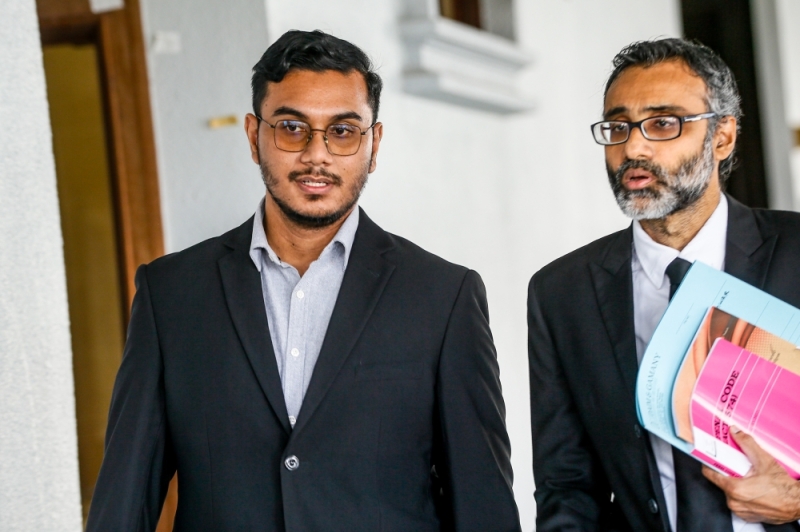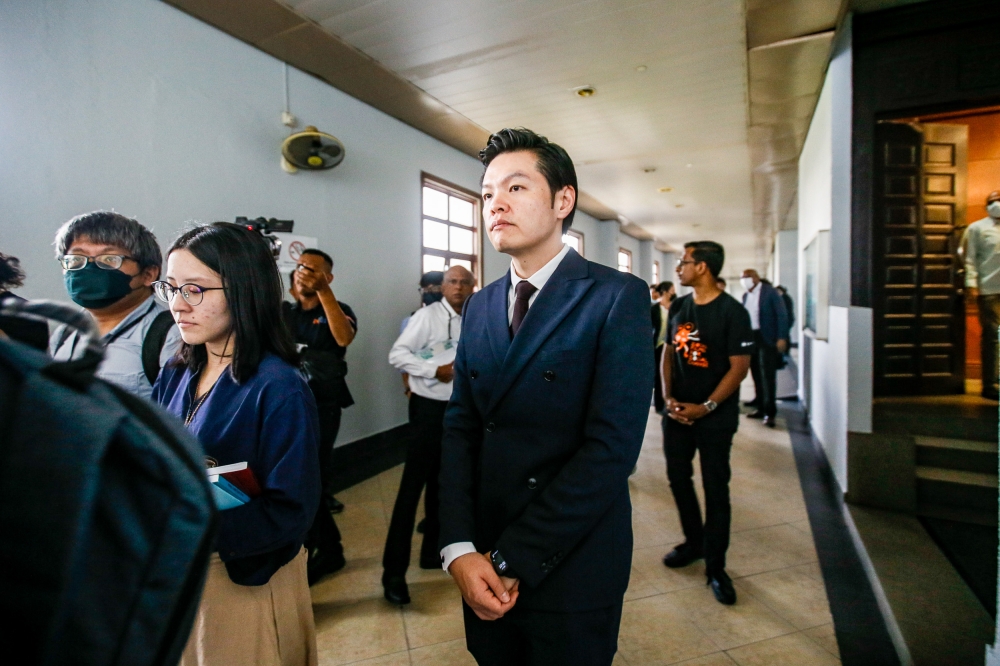Court set to hear constitutionality challenge against law used on ‘Mentega Terbang’ director

Film director Khairi Anwar Jailani arrives at the Kuala Lumpur High Court Complex in Kuala Lumpur January 17, 2024. — Picture by Hari Anggara
Friday, 10 May 2024 7:00 AM MYT
KUALA LUMPUR, May 10 — The High Court here will hear today a bid to declare Section 298 of the Penal Code — a contentious law criminalising acts deemed to offensive “religious feelings” — as unconstitutional, in a case that has become a flashpoint for freedom of expression.
Mentega Terbang’s director Khairi Anwar Jailani and producer Tan Meng Kheng, have been charged under Section 298, after being accused of intentionally seeking to “wound” the “feelings of others” through their movie.
Conservative Muslims said they were upset by the movie’s depiction of Aisyah’s curiosity about other religions and death and the afterlife, which they argued was blasphemous as Aisyah is viewed as a Muslim.
Both men previously pleaded not guilty and, through their lawyers, have sought for the High Court to decide three legal questions around the Home Ministry’s ban on the film and Section 298 of the Penal Code.
Deputy public prosecutor Parvin Hameedah said there was no necessity for the court to decide the legal questions as the issues were not novel.
Previously, a magistrates’ court had also allowed the prosecution’s request for a gag order preventing both men from making any comments or statements on their pending disposal of the cases.
The men then filed applications for applications to the High Court. On January 24, the High Court dismissed Khairi Anwar’s revision application and maintained the gag order against him. Meanwhile, another High Court lifted the gag order imposed on Tan.

Friday, 10 May 2024 7:00 AM MYT
KUALA LUMPUR, May 10 — The High Court here will hear today a bid to declare Section 298 of the Penal Code — a contentious law criminalising acts deemed to offensive “religious feelings” — as unconstitutional, in a case that has become a flashpoint for freedom of expression.
Mentega Terbang’s director Khairi Anwar Jailani and producer Tan Meng Kheng, have been charged under Section 298, after being accused of intentionally seeking to “wound” the “feelings of others” through their movie.
Conservative Muslims said they were upset by the movie’s depiction of Aisyah’s curiosity about other religions and death and the afterlife, which they argued was blasphemous as Aisyah is viewed as a Muslim.
Both men previously pleaded not guilty and, through their lawyers, have sought for the High Court to decide three legal questions around the Home Ministry’s ban on the film and Section 298 of the Penal Code.
Deputy public prosecutor Parvin Hameedah said there was no necessity for the court to decide the legal questions as the issues were not novel.
Previously, a magistrates’ court had also allowed the prosecution’s request for a gag order preventing both men from making any comments or statements on their pending disposal of the cases.
The men then filed applications for applications to the High Court. On January 24, the High Court dismissed Khairi Anwar’s revision application and maintained the gag order against him. Meanwhile, another High Court lifted the gag order imposed on Tan.

Mentega Terbang film producer Tan Meng Kheng arrives at the Kuala Lumpur High Court Complex in Kuala Lumpur January 17, 2024. — Picture by Hari Anggara
The gag order was again upheld by the Court of Appeal last month.
The Home Ministry banned the screening and publicity of the movie through the Government Gazette P.U (A) 2662 Film Censorship Act 2002, the Film Censorship (Prohibition) Order 2023 dated August 21, 2023, signed by Home Minister Datuk Seri Saifuddin Nasution Ismail.
Rights groups have criticised the ban and called on the government to drop the criminal charges against Khairi Anwar and Tan.
Article 19, a group of several human rights civil societies, said blasphemy provisions are arbitrary, open to abuse and inappropriately empower government authorities to decide the parameters of religious discourse.
It said minority groups and individuals holding unpopular opinions are often disproportionately targeted
“The enforcement of blasphemy provisions is highly problematic, especially when criminal sanctions are applied,” it said.
“As a result, blasphemy provisions promote intolerance by restricting the rights to freedom of expression, thought, and religion. Such prejudice can result in devastating consequences for society.”
The Home Ministry banned the screening and publicity of the movie through the Government Gazette P.U (A) 2662 Film Censorship Act 2002, the Film Censorship (Prohibition) Order 2023 dated August 21, 2023, signed by Home Minister Datuk Seri Saifuddin Nasution Ismail.
Rights groups have criticised the ban and called on the government to drop the criminal charges against Khairi Anwar and Tan.
Article 19, a group of several human rights civil societies, said blasphemy provisions are arbitrary, open to abuse and inappropriately empower government authorities to decide the parameters of religious discourse.
It said minority groups and individuals holding unpopular opinions are often disproportionately targeted
“The enforcement of blasphemy provisions is highly problematic, especially when criminal sanctions are applied,” it said.
“As a result, blasphemy provisions promote intolerance by restricting the rights to freedom of expression, thought, and religion. Such prejudice can result in devastating consequences for society.”
No comments:
Post a Comment